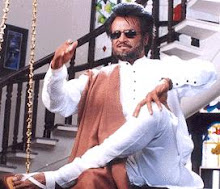Father, Child and Holy Dinosaurs
In the last five days, I have watched two movies that portrayed a father-child relationship and featured dinosaurs. Apart from this superficial and slightly freakish similarity, I think I can confidently state that Deivathirumagal and The Tree of Life come from two different universes.
The former approaches the subject like a sugarcane juicer would approach sugarcane, extracting every little drop of sugary sweetness it can from the story of a childish father and an too-smart-for-her-age child. The latter, ah, well... The latter approaches the subject with a microscope, a syringe and fine piece of forceps; digging into the cane, showing you little nuances, droplets of saccharine, strands of rough fibre and unexpectedly zooming out, to explore the existence and relevance of the sugarcane itself. Deivathirumagal is about the unordinary, it is about special people in special circumstances, but it is told in the most ordinary of manners, milking the specialness of the situation for every cheap teardrop, being needlessly cute, needlessly melodramatic, needlessly obvious, needlessly over-the-top. The Tree of Life, on the other hand, is about normal people, everyday relationships, regular emotions, jealousies, happinesses and freedoms, but it is about finding the magic in that normality, and still asking questions of it, it is about valuing those emotions, validating them, almost, but still placing them amidst a tremendous canvas. The Tree of Life is a meditation, it is a probing, self-indulgent journey, it is an artist's quest to understand his own emotions, and their place in the cosmos around him.
In Deivathirumagal, as a result, there is constant chatter, the father and daughter have a family-whistle, they have cute duet acts, he tells her stories, and gets proud of her reciting nursery rhymes. In trying to show that special people are normal, the movie forgets that normal people don't have any of this. The love between a parent and a child manifests itself far more subtly, in the way parents look at their children, in the way they discipline them, in their inherent protectiveness, in their pride, their disappointments and their desires; in the warmth of their touch, in the way they hold their them, in quiet intimacy. The Tree of Life captures that - and this is its greatest achievement.
Ultimately, The Tree of Life is Syama Sastry asking Goddess Meenakshi difficult questions in Ahiri; Deivathirumagal is the Backstreet Boys telling you which way they want it.




1 replies:
The last line encapsulates the spirit of this post-- hilarious and intelligent, with a nice touch of, how do I put it, humanness(?)
I haven't watched either, likely to watch the Tree of Life later this week. Lets see.
Post a Comment